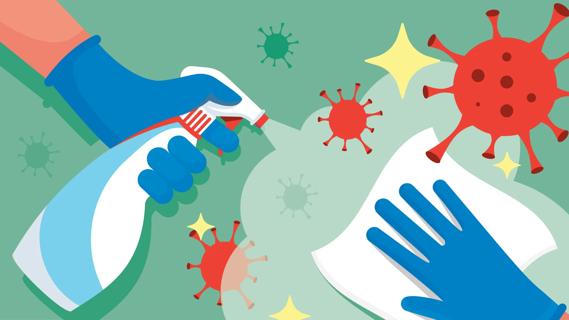Advertisement
An expert outlines your treatment options if you’re hospitalized with the virus

As the COVID-19 pandemic continues, people who are hospitalized with the virus have a variety of treatments to help them battle it. But misinformation is widespread, and that’s caused some confusion about these treatment options. To get a clearer idea of what treatments hospitals are using — and which ones they’re not — we spoke with critical care physician Joseph Khabbaza, MD.
Advertisement
Cleveland Clinic is a non-profit academic medical center. Advertising on our site helps support our mission. We do not endorse non-Cleveland Clinic products or services. Policy
Treatment options for people with COVID-19 have improved greatly since the beginning of the pandemic. While they do not guarantee a quicker recovery, they may help minimize the severity of the infection and get you back to health.
The anti-viral drug remdesivir was originally developed in 2009 as a potential treatment for hepatitis C and respiratory syncytial virus (RSV). The drug was also used to treat a number of people during various Ebola outbreaks in recent years. And it’s been tested as a treatment for other coronaviruses like Middle East Respiratory Syndrome (MERS) and SARS.
The FDA (Food and Drug Administration) granted an emergency use authorization (EUA) of remdesivir for people with COVID-19 in the spring of 2020, and later, fully approved it after studies showed the drug could shorten recovery time for people. “It’s typically reserved for use with patients with cases requiring supplemental oxygen who are early enough in their illness that blocking virus replication could help minimize the severity of their course,” says Dr. Khabbaza.
A pair of anti-inflammatory drugs have recently been granted EUAs by the FDA for use in people hospitalized with COVID-19.
The drug tocilizumab was granted an EUA by the FDA in June 2021 for use in certain people with COVID-19. The drug is a monoclonal antibody that, according to the FDA, “reduces inflammation by blocking the interleukin-6 receptor.”
Advertisement
In other words, the drug doesn’t target the virus but does reduce inflammation caused by the virus by blocking one of the markers that drive inflammation. The drug is already used as a prescription medication for inflammatory conditions like rheumatoid arthritis.
Another drug, baricitinib, has also been granted an EUA by the FDA. Known as a janus kinase inhibitor, the drug blocks a specific group of enzymes that minimizes inflammation through a different pathway than tocilizumab. It has previously been FDA-approved for use in people with moderate-to-severe active rheumatoid arthritis.
Originally only given an EUA for use in combination with Remdesivir, baricitinib received an additional EUA that allows it to be administered on its own.
The steroid dexamethasone, typically used to treat inflammation associated with conditions like asthma and arthritis, was granted an EUA by the FDA to use in a combination with other drugs to treat severe cases of COVID-19.
“Dexamethasone blunts the intensity of the inflammatory response our immune system makes when trying to fight COVID-19,” says Dr. Khabbaza. “Often, this inflammatory response is what drives severity of illness and studies have shown that minimizing it decreases the severity of disease in some patients.”
A study showed a lower 28-day mortality rate for those who received the steroid as part of their treatment, but it’s not recommended for those with more moderate cases.
People with severe cases of COVID-19 pneumonia might require a breathing tube or ventilators for help maintaining oxygen levels. Being placed on a ventilator is one of the most extreme measures when it comes to treatment, but it’s necessary because people with severe cases are unable to maintain oxygen levels on their own.
While the mortality rate of those placed on ventilators is higher than those who don’t require a ventilator, many people survive and eventually have the ventilator removed. But, Dr. Khabbaza notes, being put on a ventilator can cause other issues that require additional recovery time, too.
“Being on a ventilator is quite uncomfortable because a tube is placed in the back of your throat and into the main windpipe that leads to our lungs,” he says.
This process, Dr. Khabbaza adds, requires a fair amount of sedation for patients so they can safely tolerate the tube, which leads to more potential complications. “Sedation in ICU patients can lead to profound muscle weakness that can often accompany an ICU stay and require a longer time of rehabilitation once off of the ventilator,” he says. “Additionally, being on a ventilator brings an increased risk of resistant bacterial pneumonia developing and trauma to our vocal cords or trachea if kept in too long.”
Advertisement
Since the onset of the pandemic, a few alleged treatments have gained traction, often promoted by dubious claims across social media platforms.
The drug hydroxychloroquine received a lot of attention at the beginning of the pandemic as a possible way to treat COVID-19. At one time used as an anti-malarial drug, it’s currently used to treat lupus and rheumatoid arthritis. Despite those early suggestions, hydroxychloroquine is not used to treat COVID-19.
“Overall, hydroxychloroquine is a safe drug. However, in extensive studies, it has never been shown to be helpful in fighting COVID-19 and that is the main reason it should not be used,” says Dr. Khabbaza.
The risk of certain side effects makes hydroxychloroquine a less than ideal choice for the treatment of COVID-19. The most concerning one is torsades de pointes, a type of ventricular tachycardia where your heart beats so fast that your blood pressure plummets and the heart can’t pump enough oxygen through your body.
Other side effects include the risk of interference with other prescription medications and causing gastrointestinal issues. It was enough that in November 2020, the National Institute of Health issued a statement saying it had “formally concluded that the drug provides no clinical benefit to hospitalized patients.”
Advertisement
Another drug that has gained attention from misinformation on the internet is ivermectin. There is a prescription version for humans that comes in oral and topical forms, but this is only used for parasitic roundworm infections like ascariasis, head lice and rosacea, and in far lower and safer doses than being suggested inappropriately for COVD-19.
A different version of this particular drug is in formulations that aren’t meant for consumption by humans but, rather, used to prevent heartworm disease and other parasites in horses and cows in the concentrated veterinary forms.
While both have been the subject of speculation by misinformed social media participants, neither are — nor should be — used as a treatment for COVID-19. “Those higher doses can be very toxic for humans,” Dr. Khabbaza says, “and that can lead to severe side effects.”
Some of those side-effects stemming from large doses include:
“This medication is intended to treat parasites, not viruses,” Dr. Khabbaza adds. While one study out of Egypt claimed to show the drug’s effectiveness against COVID-19, Dr. Khabbaza points out that not all studies are created equally. “Several other studies that are of a higher standard refute the claims it’s effective,” he says.
Advertisement
The best way to protect yourself — and to drastically reduce the risk of hospitalization from COVID-19 — is to get vaccinated, Dr. Khabbaza says. “All of the data we’ve gotten about the available, approved COVID-19 vaccines is that they’re highly effective in preventing serious illness from the virus,” he points out.
While there have been breakthrough cases in people who are fully vaccinated, having the vaccine has greatly reduced the severity of the virus. “No vaccine is ever perfect in completely preventing illness,” Dr. Khabbaza says. “But they do offer you immense protection against severe cases. The number of hospitalizations for vaccinated patients due to COVID-19 is incredibly low.”
The bottom line: Get vaccinated — and avoid social media for treatment advice.
Learn more about our editorial process.
Advertisement

Studies have shown promising results, but additional research is needed

Infection and inflammation can cause you to lose your voice and have other voice changes until you’re fully healed

A COVID-19 infection can bring on depression or anxiety months after physical symptoms go away

Just like the flu, COVID-19 continues to evolve every year with new and smarter variants

The latest omicron subvariants carry specific mutations that may allow the SARS-CoV-2 virus to be better at evading immune protection

You can work out with mild COVID-19, but not in a gym, and listen to your body and don’t overdo it

Most people can return to work and regular life when they’re symptom-free for 24 hours

Lysol Disinfecting Wipes are just one of more than 500 products approved by the EPA for protection against the SARS-CoV-2 virus that causes COVID-19

If you’re feeling short of breath, sleep can be tough — propping yourself up or sleeping on your side may help

If you fear the unknown or find yourself needing reassurance often, you may identify with this attachment style

If you’re looking to boost your gut health, it’s better to get fiber from whole foods